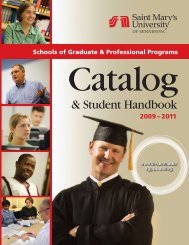PDF version - Saint Mary's University of Minnesota
PDF version - Saint Mary's University of Minnesota
PDF version - Saint Mary's University of Minnesota
You also want an ePaper? Increase the reach of your titles
YUMPU automatically turns print PDFs into web optimized ePapers that Google loves.
History<br />
view themselves in and over time, and (2) concepts <strong>of</strong> people, places, and environments. The course<br />
pays special attention to the various periods into which historians divide American history; the racial,<br />
ethnic, religious, and cultural diversity that has marked American society throughout its history; the<br />
creation and development <strong>of</strong> the United States’ political and economic institutions; the role the United<br />
States has played in the world; and the ways in which changing interpretations <strong>of</strong> their own history has<br />
shaped Americans’ understanding <strong>of</strong> their identity. Offered spring semester. Class is available only for<br />
elementary education.<br />
H270 Historical Thinking 3 credits<br />
This is a sophomore level course for students intending to major in history or history/social science, or<br />
those interested in exploring these majors. It is also recommended but not required for history minors.<br />
The course introduces students to the discipline <strong>of</strong> history, and in particular to the skills <strong>of</strong> thinking<br />
historically, <strong>of</strong> collecting and analyzing historical evidence, <strong>of</strong> critically reading the work <strong>of</strong> historians.<br />
The course also focuses on close readings <strong>of</strong> one or more major historical works which make large<br />
claims about the human experience by integrating approaches from several disciplines, and also on<br />
critical evaluation <strong>of</strong> the debates generated by these works. The course encourages students to broadly<br />
synthesize their learning and to deeply reflect on the nature <strong>of</strong> the historical discipline. There are no<br />
prerequisites for this course, but completion <strong>of</strong> a college level history course is recommended.<br />
H298 Field Exploration 1-3 credits<br />
This course is a supervised, practical application <strong>of</strong> historical concepts and techniques at institutions<br />
such as historic sites, museums and local and state historical societies.<br />
H305 Colonial and Revolutionary America in the Atlantic World 3 credits<br />
This course is designed to not only give students an overview <strong>of</strong> the history <strong>of</strong> Colonial America and<br />
the America Revolution, but also to introduce students to the larger historical events in which they<br />
took shape: the Atlantic World. The course covers a diversity <strong>of</strong> social, political, cultural, intellectual,<br />
and economic topics such as Native American societies, European empires in the Americas, European<br />
settlement in the southern, middle and northern colonies, family and community structure, class<br />
issues, the development <strong>of</strong> slavery and the transatlantic slave trade, the events leading to the American<br />
Revolution and their relation to other revolutions in the Atlantic World, the Columbian Exchange<br />
between Europe, Africa and the Americas, and the subsequent transformation <strong>of</strong> European, African<br />
and American societies around the Atlantic basin. In addition to an understanding <strong>of</strong> the major topics,<br />
students gain insight into both the methods historians use to interpret the past and the historiography<br />
<strong>of</strong> colonial and revolutionary America.<br />
H308 From the Constitution to the Civil War 3 credits<br />
The writing and ratification <strong>of</strong> the Constitution are among the United States’ proudest historical<br />
achievements, while the American Civil War was the Constitution’s greatest test. The purpose <strong>of</strong> this<br />
course is to provide students with an in-depth understanding <strong>of</strong> the developments and debates<br />
that led to the writing and ratification <strong>of</strong> the Constitution, the developments <strong>of</strong> the early national<br />
and antebellum periods that fostered greater unity among Americans, and the divisive issues and<br />
developments <strong>of</strong> the 1850s and 1860s that tore the nation apart yet ultimately affirmed the national<br />
unity envisioned by the Constitution. The course covers a diversity <strong>of</strong> social, political, cultural,<br />
intellectual and economic topics from the period between 1783 and 1865, such as the development<br />
<strong>of</strong> state constitutions, the development and spread <strong>of</strong> slavery, the market revolution, the growth <strong>of</strong><br />
democracy, westward expansion and the removal <strong>of</strong> Native Americans, early reform movements,<br />
growing sectional conflict, and the Civil War. In addition to a broad understanding <strong>of</strong> the major topics<br />
<strong>of</strong> this period, students gain insight into both the methods historians use to interpret the past and the<br />
historiography that surrounds this vital period.<br />
H311 U.S. Foreign Relations in the 20th Century 3 credits<br />
A general introduction to the history <strong>of</strong> American foreign policy in the 20th century, the course seeks to<br />
113<br />
113
















